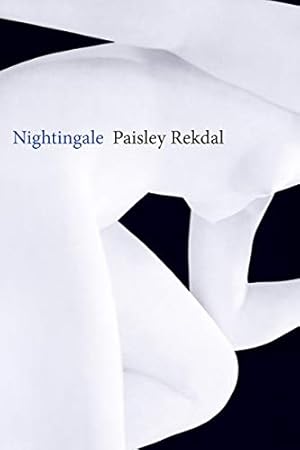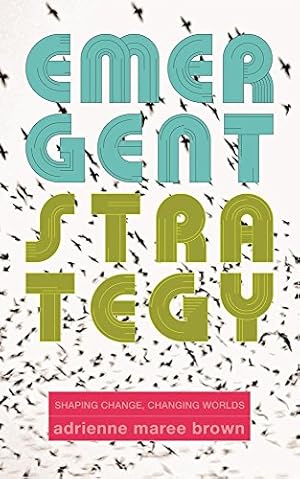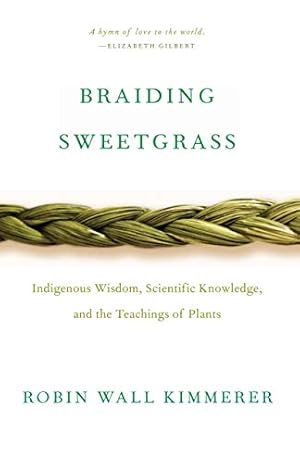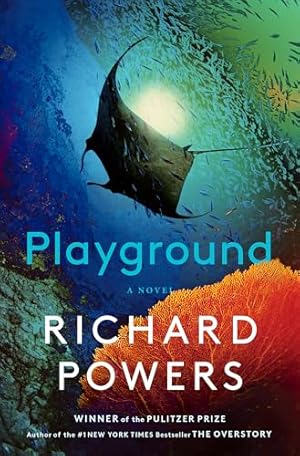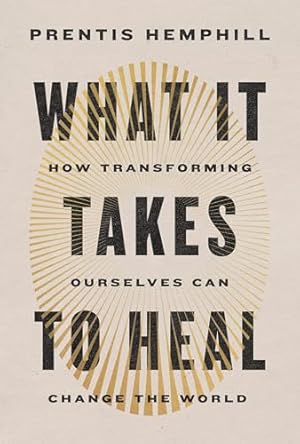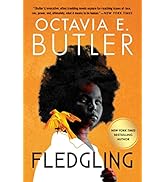| 纸书定价: | US$19.99 |
| Kindle电子书价格: | US$11.99 节省 US$8.00 (40%) |
| 卖家: | Hachette Book Group 此价格由发行人制定. |
您的会员资格和订阅

下载免费的 Kindle 阅读软件,即可立即在智能手机、平板电脑或电脑上阅读 Kindle 电子书 - 无需 Kindle 设备。
使用 Kindle 网页版即时在浏览器上阅读。
使用手机摄像头 - 扫描以下代码并下载 Kindle 阅读软件。



 Audible 示例
Audible 示例 Parable of the Sower Kindle电子书
When global climate change and economic crises lead to social chaos in the early 2020s, California becomes full of dangers, from pervasive water shortage to masses of vagabonds who will do anything to live to see another day. Fifteen-year-old Lauren Olamina lives inside a gated community with her preacher father, family, and neighbors, sheltered from the surrounding anarchy. In a society where any vulnerability is a risk, she suffers from hyperempathy, a debilitating sensitivity to others' emotions.
Precocious and clear-eyed, Lauren must make her voice heard in order to protect her loved ones from the imminent disasters her small community stubbornly ignores. But what begins as a fight for survival soon leads to something much more: the birth of a new faith . . . and a startling vision of human destiny.
买家还购买或阅读了
- The Serviceberry: Abundance and Reciprocity in the Natural World#2 热门礼品原住民研究
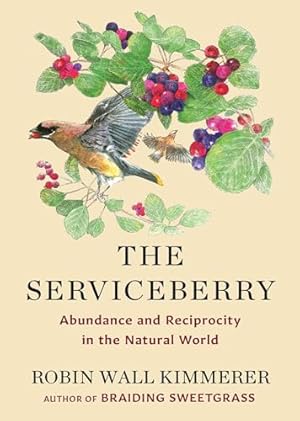 Kindle电子书US$10.99US$10.99
Kindle电子书US$10.99US$10.99
购买此商品的顾客也同时购买
 My God doesn’t love me or hate me or watch over me or know me at all, and I feel no love for or loyalty to my God. My God just is.769 位 Kindle 读者已标注
My God doesn’t love me or hate me or watch over me or know me at all, and I feel no love for or loyalty to my God. My God just is.769 位 Kindle 读者已标注 God is Power— Infinite, Irresistible, Inexorable, Indifferent. And yet, God is Pliable— Trickster, Teacher, Chaos, Clay. God exists to be shaped. God is Change.660 位 Kindle 读者已标注
God is Power— Infinite, Irresistible, Inexorable, Indifferent. And yet, God is Pliable— Trickster, Teacher, Chaos, Clay. God exists to be shaped. God is Change.660 位 Kindle 读者已标注
来自品牌

Read more from Octavia Butler
-
Shop the Octavia Butler Store
-

Octavia E. Butler, the “grand dame of science fiction,” was the author of several award-winning novels including The Parable of the Sower.
Recipient of a MacArthur Foundation “genius” grant and numerous literary awards, she has been acclaimed for her lean prose, strong protagonists, and social observations in stories that range from the distant past to the far future.
来自出版社


编辑评论
来自《出版家周刊》
Copyright 1993 Reed Business Information, Inc.
来自《学校图书馆杂志》
Barbara Hawkins, Oakton High School, Fairfax, VA
Copyright 1994 Reed Business Information, Inc.
来自《图书馆杂志》
Copyright 1993 Reed Business Information, Inc.
From Booklist
来自《科克斯评论》
媒体推荐
"Octavia Butler's Parable of the Sower is a stunner. It's a terrifying vision of a dismal future brought on by the willful ignorance, racism and greed of human beings, and an eerily dangerous parallel to our present path. Ms. Butler gives us a satisfying protagonist in the hypersensitive teenager Lauren, whose courage and wits are an infinite source of inspiration."―Flea, Wall Street Journal
"Butler felt to me like a lighthouse blinking from an island of understanding way out at sea. I had no idea how to get there, but I knew she had found something life-saving. She had found a form of resistance. Butler and other writers like Ursula Le Guin, Toni Morrison and Margaret Atwood...used the tenets of genre to reveal the injustices of the present and imagine our evolution."―Brit Marling, New York Times
"In the ongoing contest over which dystopian classic is most applicable to our time, Octavia Butler's 'Parable' books may be unmatched."―New Yorker
"A gripping tale of survival and a poignant account of growing up sane in a disintegrating world."―New York Times Book Review
"One of the most important and groundbreaking science-fiction authors."―Entertainment Weekly
"A powerful story of hope and faith."―Denver Post
"There isn't a page in this vivid and frightening story that fails to grip the reader."―San Jose Mercury News
"Artfully conceived and elegantly written . . . Butler's success in making Lauren's subsequent odyssey feel real is only the most obvious measure of this fine novel's worth."―Cleveland Plain Dealer
"A real gut-wrencher . . . What makes Butler's fiction compelling is that it is as crisply detailed as journalism. . . Often the smallest details are the most revelatory."―Washington Post
"A prophetic odyssey."―Essence
"Butler tells her story with unusual warmth, sensitivity, honesty, and grace; though science fiction readers will recognize this future Earth, Lauren Olamina and her vision make this novel stand out like a tree among saplings."―Publishers Weekly (starred review)
"One of science fiction's most important figures, an author who wrote cracking, crackling, accessible and fast-moving adventure stories shot through with trenchant and smart allegories about race, gender and power . . . Parable of the Sower has never been more relevant."―Boing Boing
"One of Butler's most visceral, accomplished works . . . this is the stuff of the best dystopian science fiction: a real-life warning made fictional. Even in 1993, Butler understood climate change could well be the spark that ignites the dry kindling of race, class, and religious strife into a conflagration that will consume our nation. If anything, those issues are even more pressing a quarter-century later . . . Butler's vision of hard-won hope in challenging times is more essential now than ever before, and well worth seeking out in this new edition."―B&NBlog
"Butler [had a] practically psychic ability to predict the future."―New York Magazine, "The Best Books for Budding Black Feminists, According to Experts"
"A dystopian classic."―Kirkus Reviews
作者简介
Octavia E. Butler (19472006) was an American science fiction and fantasy writer, one of very few African American women in the field. She won both the Hugo and Nebula Awards and in 1995 was the first science fiction writer ever to receive the MacArthur Foundation Genius grant.
From AudioFile
基本信息
- ASIN : B0BZHT26LV
- 出版社 : Grand Central Publishing (2023年 3月 28日)
- 出版日期 : 2023年 3月 28日
- 语言 : 英语
- 文件大小 : 1085 KB
- 标准语音朗读 : 已启用
- 屏幕阅读器 : 受支持
- 更先进的排版模式 : 已启用
- X-Ray : 已启用
- 生词提示功能 : 已启用
- 纸书页数 : 356页
- 亚马逊热销商品排名: 商品里排第713名Kindle商店 (查看Kindle商店商品销售排行榜)
- 商品里排第1名黑人与非裔美国人科幻小说
- 商品里排第1名非裔美国人科幻小说
- 商品里排第5名后启示录科幻小说电子书
- 买家评论:
关于作者
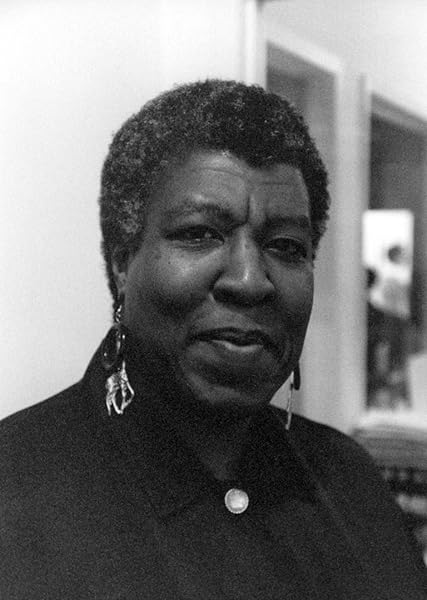
OCTAVIA E. BUTLER (1947–2006) was the renowned author of numerous ground-breaking novels, including Kindred, Wild Seed, and Parable of the Sower. Recipient of the Locus, Hugo and Nebula awards, and a PEN Lifetime Achievement Award for her body of work, in 1995 she became the first science- fiction writer to receive the MacArthur Fellowship ‘Genius Grant’. A pioneer of her genre, Octavia’s dystopian novels explore myriad themes of Black injustice, women’s rights, global warming and political disparity, and her work is taught in over two hundred colleges and universities nationwide.
买家评论
买家评论(包括商品星级评定)可帮助买家进一步了解商品,并确定商品是否适合他们。
在计算整体星级评定和按星级划分的百分比时,我们不使用简单的平均值。我们的系统会考虑评论的时间以及评论者是否在亚马逊上购买了商品等因素。系统还对评论进行了分析,以验证其可信度。
详细了解买家评论在亚马逊上的运作方式Great book!!!
热门评论来自 美国
现在无法筛选评论。请稍后再试。
-
2015年5月1日在美国发布评论The Parable of the Sower is a wonderfully constructed vision of the world following a climate related collapse of western society. I mean wonderful in the sense that this world that Octavia Butler has brought to life inspired in me a genuine sense of wonder. Sci-fi books are supposed to create in the reader a sense of disbelief, a longing for the future and what could come with it, and this book did exactly that, while at the same time attacking and conquering huge themes like religion and racism. Racism in particular is a theme that I would like to spend quite a bit of time addressing, but religion is also something that I will touch on in some detail. There are a variety of other details and issues that could be addressed, but these are the two that stuck out to me like a sore thumb, and also the two that I was most interested in writing about. This book was excellent, compelling, and definitely worth more than one read.
The story that Octavia Butler tells is a compelling story of survival and community. The opening of the book starts en medias res, exactly as a good futuristic novel can. I personally feel that telling too much of a back-story can destroy the reader’s ability to concoct one itself, it also takes away from the author’s ability to create suspense and mystery in the novel itself. Butler does a very good job of giving us a gripping story without boring us with the details of the failing of the society that once existed. It is very easy to take on the mindset of a young girl while reading, and that makes digesting all of the new and sometimes confusing information much more easily. The novel then goes on to talk about the sense of community that is felt in the walled “neighborhood” that Lauren, the main character and narrator, lives in. This neighborhood seems to be a well-oiled machine, despite the immediately apparent racial tensions to be found inside of the community. There is a division among the white members of the community and the other racial groups. This makes a lot of sense considering the racial tensions that exist even in the world today, but it was interesting to see that Butler does not envision a post-racial world for our future.
One of the bigger themes of this book is “new slavery”; I put this in quotes only because I believe it to be a coined term and not merely an expression that I have made up. “New slavery” was introduced around the same time, as prisons became an industry rather than a place of reform. Butler speaks of this issue in a speech she gave which is the secondary reading for this week, “Every now and then you hear– and I’m not talking about ante-bellum slavery but modern-day slavery–every now and then you hear about some group of homeless people or illegal aliens or other people who have been held in slavery and I sort of combined slavery and throw-away workers and prison problems because in Parable of the Sower there is slavery and it is entirely legal because it isn’t called “slavery.” This quote speaks to her inclusion of the “new slavery” in her novel. This kind of slavery is found encapsulated in the city of Olivar, the fictional city being built where “skilled” workers are needed. The characters in the novel fear that this city is merely an excuse to capture people and indenture them to the larger corporate structure. This is a frightening reality because it is not unrealistic. There are certainly places in this dystopian America where slaves are found. They are people who do not have money and then work for company credit, but they never make quite enough money to afford their living expenses, so they become indebted to the company they work for, and end up owing the company massive amounts of money, and passing that on to their children when they die, creating a system of debt slavery that persists indefinitely.
Butler definitely set out to make this a main feature in her book, but what is interesting is that the people of color in the novel feel that the city of Olivar would only want white workers. This is interesting because for as taught as the racial tensions are in the future, there does not seem to be hope for anyone who did not already have money when the country collapsed. Some people are simply “slightly better off”.
The effects of this “new slavery” can be found in the people that the characters meet later on in the story; some of the people who they run into like Emery and Tori. They are both escaped slaves who are now dealing with the consequences of living a slave’s existence. They are also both hyper-empathetic, just like our narrator. This means that not only can they see someone in pain and relate, but also they actually feel it, and it is considered to be debilitating. Our narrator does not like to share with people that she has this condition, but she notices that the newer members of the group share her condition and immediately bonds with them over it. This hyper-empathy is a big reason why Lauren makes such an interesting character, because it shows how painful killing is for her, and how everything she does has a reason, and also is in part why she founds her religion, Earthseed.
Religion is an interesting topic in any book, especially so in this one, as our character has spread the seeds for her own religion to take root, Earthseed. Earthseed is a new religion that has some elements of a bunch of already existing belief systems worked into it. The basic idea of Earthseed is that “the destiny of mankind is to take root amongst the stars,” this is interesting because it is both a spiritual philosophy, and a very real belief of the narrator. Lauren believes that the discontinuation of the space program is foolish, and that they should abandon the Earth and that they should try again somewhere else.
Earthseed fascinates me, and I think I know where it stems from. Lauren lives in a firmly Baptist community, but does not have the faith of her father. Earthseed is a comfort to Lauren, and it is that simple. It is a basic philosophy that has sprung out of her discomfort with the world around her. She is living in a virtual hell, and has had to come up with some way to make her own truth. The truth she chooses to believe rather than a truth that is told to her. This is exactly where all religion stems from. People as a whole would not believe in something and it was not comforting to them. This is why I think the theme of religion is so interesting a Cli-fi book. With or without realizing it, Octavia Butler has created a wonderful comparison between a religion founded by an 18 year old, and hundreds of thousands of scientists’ conclusive evidence that climate change is very, very real. In the secondary reading Butler quotes a cartoon, the interesting part was this, “Make up your own truth and stick to it, no matter how little sense it makes. And sooner or later, you’ll have converts. Trust me.” This rings the truth to me about the world in general. People are so much more likely to believe in and idealize something that comforts them, rather than something that tells them they need to change. This is the whole fundamental issue we have had with the class. Our big question, “what can we do?” is answered by this simple quote. We need to make up a truth that people want to believe in, we cannot keep throwing the discomforting truth in their faces or they will continue to believe their own truths, namely “there is nothing that I can do.” Octavia Butler draws a comparison between a people who are still in disbelief about how broken their world is, and their deep belief that things will return to what they once were. This is a constant theme throughout the beginning of the book. Instead, a new religion is formed, which has the potential to have hundreds of followers, all because it is comforting and simple. This struck me as genius, and I may be reading a little too deeply, but I gleamed from Butler’s speech that this may have been on purpose. I liked that in particular about this book.
The Parable of the Sower has struck me in a way that a lot of books have not. I do not however think that this book will make waves in the ocean of denial surrounding climate change. I don’t think that the book deals closely enough with what we, as a species, have done to destroy the planet, and therefore keeps us from feeling particularly guilty. This book is rather a story about survival, friendship, and faith. I liked it immensely and would even consider adding it to my course syllabus when I am finally a teacher rather than a student.
-
2025年1月13日在美国发布评论This is my favorite book of all time. When I read this in 1993, I didn't like it. How could the USA possibly fall so far? Since I thought the idea of my country failing in any way was near impossible to me, I put the book away.
The book's story started in 2024. I reread it last year and again this year. Since 1993, several events have changed my mind. The 9/11 attack, school shootings, the 2008 bank crisis, the 2020 pandemic, the election of a convicted felon, are some events that come to mind. A somewhat prophetic novel from an author I wish was still with us.
-
2025年1月17日在美国发布评论This is a must-read for those who truly enjoy dystopian narratives. The Parable of the Sower explores societal collapse, religion, race, and survival. Lauren’s journey, shaped by her hyper-empathy and her creation of Earthseed (A new way about thinking about God), is thought-provoking. The story is gripping, especially during the early chapters and the pivotal moment when Lauren is forced to leave her home after a devastating attack.
The story is intriguing and keeps readers on edge, especially in the first half. The pivotal moment when Lauren is forced to leave her walled community after a devastating attack is gripping and emotionally charged. However, the pacing slows down after this turning point, with less intensity as Lauren journeys through the outside world.
I’ll also say the relationship with Laren and the 57 yrl old was a bit unsettling, even if it’s consensual (but that might be a personal view).
Overall, I think Octavia Butler delivers a unsettling and unforgettable story that keeps readers engaged and challenges their perspectives. Highly recommended!
-
2015年5月1日在美国发布评论Growing up I had never been exposed to much about religion. To this day my thoughts on religion are never substantial; sometimes I’ll have an occasional deep thought, but a fleeting one at that until I turn back to the life in front of me. Lauren Olamina, the protagonist in Parable of the Sower by Octavia E. Butler, on the other hand was brought up into an intensely religious household that she learned to resent. Lauren’s father was a Baptist minister, raising her and her brothers in an intensely religious fashion in a post-apocalyptic time outside of Los Angeles. The post-apocalyptic America is not one ravaged by supernatural creatures or extreme weather conditions, but an extremely plausible world set into motion by drought and racial tensions. America is at the bottom of a downward spiral with Lauren’s gated California neighborhood being the only thing keeping the drug addled maniacs and thieves from raiding her community on a daily basis. Disaster is constantly right outside of Lauren’s gate causing the extremely bright but mentally damaged young woman to attempt to find her place in collapsing America. Refusing to believe in the religion her father preaches to her daily, Lauren begins establishing her own beliefs in God that translate into what she calls Earthseed. To Lauren, God is change. Earthseed presented through Lauren is Butler’s way of examining our own society. By predicting what will become of our society if it does not overcome individualism, racism, and tendencies towards violence, Butler presents her solution through Earthseed.
When society crumbles, so does 99% of the population. Anyone not protected in a gated or guarded society immediately turns towards looting, pillaging, rape, and especially arson. A new drug has been introduced on the streets dubbed “pyro” that makes watching a fire more exhilarating and enjoyable than having sex. Lauren being born in 2009 (the novel was written in 1993) has known only this nightmarish America her entire life. Racial tensions are at an all-time high, water is more expensive than food, and the government has basically collapsed. While the adults are fine with attempting to live life the way it used to be, preaching the same bible verses over again, and still believing things may eventually return to “normal”; Lauren is the next generation learning to live in this new society. Living in this new society and not understanding the old, Lauren rejects her father’s God. Lauren believes in a new religion she has discovered entitled Earthseed. Lauren claim’s she has not invented or made it up, but discovered it. There is no all mighty being or supernatural element to the God in Earthseed, God is only change. The book presents little Earthseed scripture and its beliefs throughout, which later make more sense towards the end of the novel. Earthseed believes that praying does nothing but assist the prayer, and that effort should be put into action to make change. The more the proverbs are read in the book the more the reader is able to comprehend Lauren’s beliefs. Lauren literally believes that God is change. Some of Earthseed’s texts give more insight into her complex thinking “We do not worship God. We perceive and attend God. With forethought and work, we shape God.” And “God is Power- infinite, irresistible, inexorable, indifferent. And yet, God is Pliable- trickster, teacher, chaos, clay. God exists to be shaped. God is Change”. I really loved the thought put into Lauren’s complex world view and it makes complete sense considering the dangerous world she learned to grow up in. Lauren is forced to leave the only home she has ever known when crazy drug addled arsonists come to pillage and destroy her neighborhood. If I grew up in that type of world I am not sure what I would believe in, but Lauren’s views are all justified and change is the belief and system that keeps her alive in post-apocalyptic California. Butler, through Lauren, is expressing that she believes that to get through the hard times any nation is facing, they need to be adaptable, diverse, and learn to embrace change. Another quote from Earthseed demonstrates Butler’s thoughts on diversity, “Embrace diversity. Unite—or be divided, robbed, ruled, killed by those who see you as prey. Embrace diversity, or be destroyed”.
My main issue with Butler’s Earthseed is the way that she presents it. At first Earthseed is not exactly referred to as a religion by Lauren until other people she meets on her journey refer to it as such. My problem with Butler deciding to refer to Earthseed as a religion is that it is too distinctly different from any other religion to be classified as such. A religion is classified by most sources as a set of beliefs concerning the cause, purpose, and nature of the universe; and the Gods that preside over it. Earthseed perfectly fits the set of beliefs and practices used and agreed on by a group of people, but when addressing its God of Change, it is not actually referring to a deity as is every other religion. Also converting the people Lauren traveled with to even accept the idea of something they were referring to as a religion would not go as quickly as it did in the book. It is hard enough reaching out to someone without a religion to think about one, but trying to convince a devout religious individual about a new way of thinking seems like it would not be possible.
Reading Butler’s essay “Devil Girl From Mars”: Why I Write Science Fiction, made it clear where Lauren’s attitude and beliefs came from. Butler believes in a well-educated, literate, news observing, and accepting society. Butler seems to view society on a macro level more so than a micro one, focusing on big picture issues and the state of the human race as a whole. Butler understands that global warming issue an issue in our society which is why she chose to have that be the cause of the draughts and erratic weather in her novel. From focusing on global warming in many of the novels we have read so far I believe Butler paints the most realistic picture of the consequences of ignoring global warming. I agree with Butler’s focus on the continuing productive existence of the human race. I often also have thoughts about human society as a whole and believe Butler made well educated and productive points, the things that she exaggerated for the sake of her novels are actual issues we need to be focusing on today.
Overall Parable of the Sower was one of the more realistic and enjoyable post-apocalyptic books I’ve read. The religious undertone was present but not abrasive, and focused more on religion as a general concept. Instead of focusing on one religion, Butler commented on religion as it fits into society as a whole.
来自其他国家/地区的热门评论
-
 Maia2023年10月19日在巴西发布评论
Maia2023年10月19日在巴西发布评论5.0 颗星,最多 5 颗星 Meu primeiro contato com Octavia Butler
Em tempos de fim de mundo, esse livro me abraçou quando precisei, e me chacoalhou pra vida! Escrita profunda, desafiadoramente filosófica, Octavia já tinha previsto o que estamos vivendo em 2023 há 30 anos.
Recomendo se você tem tempo, paciência e curiosidade em compreender a história. Ela pode parecer um pouco lenta pra quem está acostumado com jornadas de herói épicas para salvar o mundo, encontrar a cura, etc. Não é pra salvar o mundo, é pra salvar a nós mesmos.
Mal posso esperar pra ler o próximo, comprei em inglês pra treinar a língua e foi uma ótima decisão! Tive dificuldade com uma palavra ou outra, mas no geral é tranquilo de compreender se você já tem um domínio básico.
 Em tempos de fim de mundo, esse livro me abraçou quando precisei, e me chacoalhou pra vida! Escrita profunda, desafiadoramente filosófica, Octavia já tinha previsto o que estamos vivendo em 2023 há 30 anos.5.0 颗星,最多 5 颗星 Meu primeiro contato com Octavia Butler
Em tempos de fim de mundo, esse livro me abraçou quando precisei, e me chacoalhou pra vida! Escrita profunda, desafiadoramente filosófica, Octavia já tinha previsto o que estamos vivendo em 2023 há 30 anos.5.0 颗星,最多 5 颗星 Meu primeiro contato com Octavia Butler Maia
Maia
2023年10月19日在巴西发布评论
Recomendo se você tem tempo, paciência e curiosidade em compreender a história. Ela pode parecer um pouco lenta pra quem está acostumado com jornadas de herói épicas para salvar o mundo, encontrar a cura, etc. Não é pra salvar o mundo, é pra salvar a nós mesmos.
Mal posso esperar pra ler o próximo, comprei em inglês pra treinar a língua e foi uma ótima decisão! Tive dificuldade com uma palavra ou outra, mas no geral é tranquilo de compreender se você já tem um domínio básico.
该评价的图片

-
 Mitja Batišta2025年1月15日在德国发布评论
Mitja Batišta2025年1月15日在德国发布评论5.0 颗星,最多 5 颗星 It’s a book
And it came as a book.
-
-
 Aaron2024年8月29日在英国发布评论
Aaron2024年8月29日在英国发布评论5.0 颗星,最多 5 颗星 Bought as gift
I have read this before and bought it for a friend that I thought might enjoy it. Butler has quite a dark idea of the near future that is disconcerting in how possible and realistic it feels. A great read.
-
 stan2023年3月22日在法国发布评论
stan2023年3月22日在法国发布评论4.0 颗星,最多 5 颗星 très intrigant et réussi
Sur une recommandation d'un ami, j'ai lu ce livre (peu commenté en France, semble-t-il), qui commence comme une dystopie avant d'évoluer vers des développements d'ordre plus spirituel tout aussi passionnants













